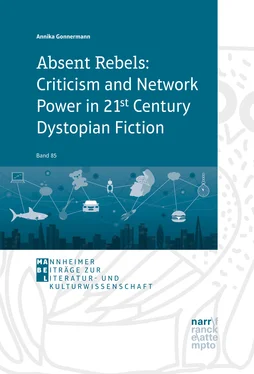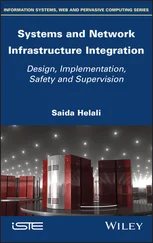Annika Gonnermann - Absent Rebels - Criticism and Network Power in 21st Century Dystopian Fiction
Здесь есть возможность читать онлайн «Annika Gonnermann - Absent Rebels - Criticism and Network Power in 21st Century Dystopian Fiction» — ознакомительный отрывок электронной книги совершенно бесплатно, а после прочтения отрывка купить полную версию. В некоторых случаях можно слушать аудио, скачать через торрент в формате fb2 и присутствует краткое содержание. Жанр: unrecognised, на английском языке. Описание произведения, (предисловие) а так же отзывы посетителей доступны на портале библиотеки ЛибКат.
- Название:Absent Rebels: Criticism and Network Power in 21st Century Dystopian Fiction
- Автор:
- Жанр:
- Год:неизвестен
- ISBN:нет данных
- Рейтинг книги:3 / 5. Голосов: 1
-
Избранное:Добавить в избранное
- Отзывы:
-
Ваша оценка:
- 60
- 1
- 2
- 3
- 4
- 5
Absent Rebels: Criticism and Network Power in 21st Century Dystopian Fiction: краткое содержание, описание и аннотация
Предлагаем к чтению аннотацию, описание, краткое содержание или предисловие (зависит от того, что написал сам автор книги «Absent Rebels: Criticism and Network Power in 21st Century Dystopian Fiction»). Если вы не нашли необходимую информацию о книге — напишите в комментариях, мы постараемся отыскать её.
Absent Rebels: Criticism and Network Power in 21st Century Dystopian Fiction — читать онлайн ознакомительный отрывок
Ниже представлен текст книги, разбитый по страницам. Система сохранения места последней прочитанной страницы, позволяет с удобством читать онлайн бесплатно книгу «Absent Rebels: Criticism and Network Power in 21st Century Dystopian Fiction», без необходимости каждый раз заново искать на чём Вы остановились. Поставьте закладку, и сможете в любой момент перейти на страницу, на которой закончили чтение.
Интервал:
Закладка:
dystopian fiction posits a society which – however outlandish – is clearly extrapolated from that which exists. […] [T]he dystopian writer presents the nightmare future as a possible destination of present society, as if dystopia were no more than a logical conclusion derived from the premises of the existing order, and implies that it might very well come about unless something is done to stop it. (107)
Fundamentally, dystopias exhibit a mirroring quality, reflecting the devolutionary tendencies of their time (cf. Tuzinski 32).4 Suvin goes one step further still and declares that “there is little point in discussing utopias as separate entity, if their basic humanistic, this-worldly, historically alternative aspect is not stressed and adopted as one of their differentiae genericae ” ( Metamorphoses 42, emphasis in the original). Utopian writing – as an exercise in fictional sociology – then always has a clear connection to the present, although it is mostly set in the future (cf. Bauman, Freedom 89).5
Formulating criticism, however, is only one of two functions dystopian narratives usually exhibit. When Han, Triplett, and Anthony argue “that some aspect of critique is at least implicit within all types of dystopian works” (“Introduction” 4), it is vital to remember that these books are never a neutral inquiry into the states of things, but actually burdened with normative standards circling around the question of the good life. It is therefore imperative “to recognise the partiality of theoretical and political positions” (Pinder 257) to be found in dystopian writing. Dystopias are always defined by their didactic warning function;6 both Christine Lehnen and David Lorenzo even consider the warning effect a prescriptive feature of their genre definitions; dystopias are narratives that “serve as warnings regarding the future of contemporary society” (Lorenzo 6), and “can be seen as the epitome of literature in its role as social criticism” (Booker, Literature 3). They are the product of vigilant social analysts constructed as a warning, a “prophetic vehicle, the canary in a cage, for writers with an ethical and political concern” (Baccolini and Moylan, “Introduction” 2). Referring back to the “sociopolitical tendencies that could, if continued, turn our contemporary world into the iron cages portrayed in the realm of [e]utopia’s underside (ibid.),7 dystopian fiction is always meant as a normative criticism of the socio-cultural and historical characteristics of the time of its own origins. Yet, while many critics take this circumstance for granted, no study has yet attempted to classify the use of criticism in dystopian fiction. It is therefore worthwhile to investigate the construction of critique in these novels as such an analysis would allow the reader insights into the hidden agenda of a given text. Without a thorough examination of the criticism employed, the warning function of dystopian fiction might vanish into thin air.
Suitable for this endeavour is Rahel Jaeggi’s taxonomy of criticism, which provides a fruitful template for the analysis of dystopian fiction on a non-content level, illuminating the narrative structures and elements and opening them up for analysis. Her Kritik von Lebensformen (2014, trans. Critique of Forms of Life , 2018), originally written as an attempt to return the critical theory of the Frankfurt School to the attention of philosophical and social analysis, thematises modes of criticism, the good life, and the seeming impossibility of criticising 21 st-century life styles without resorting to a patronising, prescriptive, often westernised discourse of how individuals should live. She disagrees with the liberal notion and “widespread relativism which maintains [that] we are in no position to criticise particular cultures or societies or ways of life” (Wilding), insisting that we must continue to criticise one another based on the criteria of how successful certain life forms are in terms of problem-solving. Jaeggi claims that if a certain form of life is obviously no longer able to process arising problems sufficiently, critique is not only justified but imperative. By delineating a discourse which is not defined by content but rather discussing forms of life abstractly, Jaeggi manages to venture forth against “ethical abstinence,” i.e. against a laissez-faire mentality (cf. Jaeggi, Critique 1–3), while simultaneously refraining from partaking in a patronising Western discourse.
Her inquiry into forms of life and what constitutes the ‘good life’ (cf. Arentshorst 274) introduces an innovative taxonomy of criticism that is also directly applicable to dystopian fiction. Understanding criticism as an initiative and “impetus for transforming a (social) formation based on reasons” ( Critique 84), Jaeggi establishes a meta-language to critically evaluate the formation of criticism. Her taxonomy differentiates between ‘external,’ ‘internal,’ and ‘immanent criticism.’ The most basic form of criticism with the most obvious result is what Jaeggi terms ‘external criticism.’ This form imposes external standards onto an item or construct, questioning it in its entirety by championing an alternative to the status quo. The two – reality and alternative – are usually mutually exclusive and cannot be reconciled, meaning that the critic aims to overcome the original target of criticism (cf. ibid. 177). As Jaeggi writes,
external criticism applies an external normative standard to an existing society. This standard is external in the sense that it is supposed to be valid regardless of whether it already holds within an existing community or an existing social institutional structure and of whether it is ‘contained’ in a given state of affairs, and it judges the given situation according to whether it satisfies this standard. Criticism in this case aims to transform, supersede, or reorient what is given on the basis of norms that are brought to bear on it from the outside. ( Critique 178)
Intending to harvest the power of external criticism, the critic is defined by her reluctance to share the norms and values esteemed in the given society and thus chooses to distance herself from that society (cf. ibid.). While Jaeggi herself does not illustrate her argument, it is an easy task to conceive of one oneself: the West criticising the role of women in Arab countries externally, for instance, is a relevant and highly debated example in the context of post-colonial criticism and the supposed moral superiority of the West.
Jaeggi goes on to introduce her next category, which she terms ‘internal criticism’ – a category related to an everyday understanding of critique and frequently used to detect inherent contradictions. This form of criticism assumes that “although certain ideals and norms belong to the self-understanding of a particular community, they are not actually realized within it” (ibid. 179). Jaeggi introduces examples to make her point clear: the Christian community which preaches the gospel yet rejects refugees; or a CEO who champions women’s rights in public, yet favours male employees when hiring new staff (cf. ibid. 179f.). Contrary to external criticism, which imposes its standards externally, ‘internal criticism’ rests on the conviction that “the standard of criticism resides in different ways in the matter itself. ” (ibid. 180, emphasis in the original) Criticism grows out of promises made but not kept, general principles, or norms that might have been proclaimed, however which are not (fully) realised by the community. Internal criticism is at its heart a conservative technique, advocating the re-establishment of certain norms and practices by illuminating “an inconsistency either between assertions and facts, between accepted norms and practices, between appearance and reality, or between claim and realization” (ibid.). It does not champion an alternative system, but rather results in upholding of the status quo (cf. ibid. 182) – the source of its persuasiveness and power. Jaeggi argues that this type of criticism is employed regularly, for it demands very little effort. Its “ practical and pragmatic advantages ” (ibid. 183, emphasis in the original) lie in the fact that this type of criticism merely reminds the community of what they signed up for in the first place: “[n]o one, we assume, can wish to remain in an internal contradiction” (ibid.). Essentially, critic and the object of criticism are part of the same in-group since they belong to a community that has already accepted certain norms and values.
Читать дальшеИнтервал:
Закладка:
Похожие книги на «Absent Rebels: Criticism and Network Power in 21st Century Dystopian Fiction»
Представляем Вашему вниманию похожие книги на «Absent Rebels: Criticism and Network Power in 21st Century Dystopian Fiction» списком для выбора. Мы отобрали схожую по названию и смыслу литературу в надежде предоставить читателям больше вариантов отыскать новые, интересные, ещё непрочитанные произведения.
Обсуждение, отзывы о книге «Absent Rebels: Criticism and Network Power in 21st Century Dystopian Fiction» и просто собственные мнения читателей. Оставьте ваши комментарии, напишите, что Вы думаете о произведении, его смысле или главных героях. Укажите что конкретно понравилось, а что нет, и почему Вы так считаете.












